Field Days
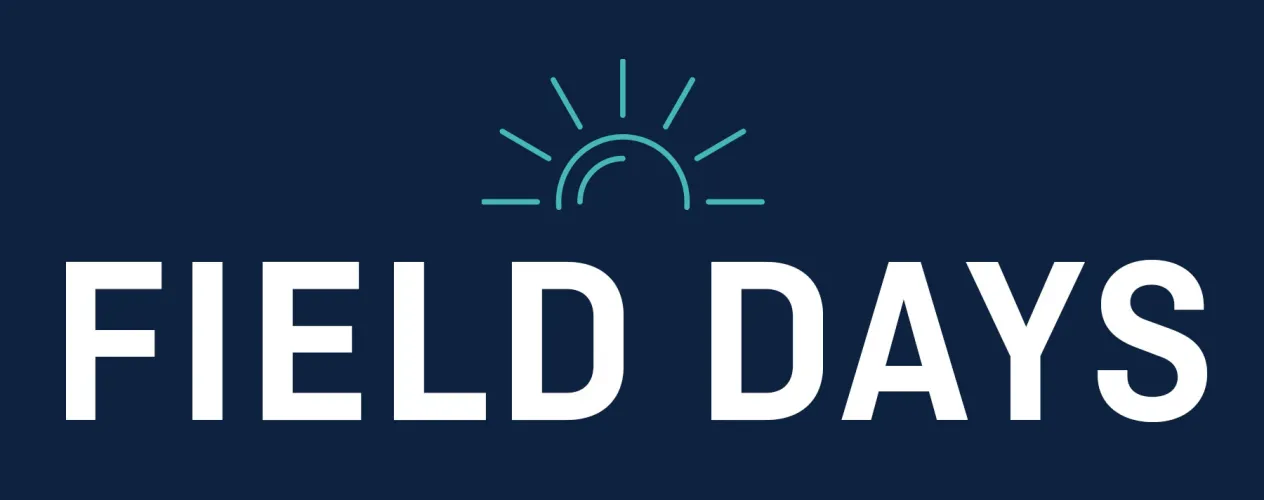
Each summer, Fielding School students gain hands-on experience practicing public health locally, internationally and in between. For many, these internships provide the first opportunity to apply classroom lessons and to weigh potential public health career paths. On the pages that follow, eight such students recount their recent summer training and how it has influenced their post-graduation plans.
Cynthia Blackman
MS Student
Department of Environmental Health Sciences
Summer Training: Navy Preventive Medicine Unit, San Diego
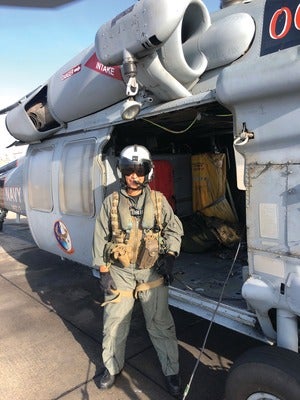 WORKER HEALTH AND SAFETY, along with environmental protection, have been my lifelong passions. I did my summer internship with the Navy Preventive Medicine Unit in San Diego, working closely with the Industrial Hygiene division in conducting baseline and periodic industrial hygiene surveys; exposure monitoring; sound-level measurements; ventilation and air-quality assessments; respirator fit testing; mold, lead and asbestos sampling; and occupational safety and health program training. I also researched whole-body vibration exposure and back pain in the helicopter aircrew.
WORKER HEALTH AND SAFETY, along with environmental protection, have been my lifelong passions. I did my summer internship with the Navy Preventive Medicine Unit in San Diego, working closely with the Industrial Hygiene division in conducting baseline and periodic industrial hygiene surveys; exposure monitoring; sound-level measurements; ventilation and air-quality assessments; respirator fit testing; mold, lead and asbestos sampling; and occupational safety and health program training. I also researched whole-body vibration exposure and back pain in the helicopter aircrew.
Throughout my 19-year experience in military environments, I have had the privilege of serving with Sailors and Marines with various skill sets. These skill sets often expose them to a multitude of hazards, all of which are identified and mitigated for by naval industrial hygienists. My goal is to protect those who protect us — our Sailors and Marines. Through this internship, I was able to take my first steps toward ensuring that these protections are in place. I was able to not only see, but also participate in the various programs geared toward securing their safety. Partaking in this internship reinforced my desire to become a naval industrial hygienist.
Crystal Shaw
PhD Student
Department of Biostatistics
Summer Training: Pfizer, Inc., La Jolla, California
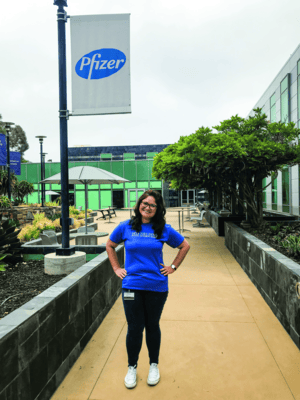 BIOSTATISTICS LIVES AT THE INTERSECTION of my love for quantitative, analytical thinking and my passion for making a difference. I chose this field for my PhD studies so that I could dedicate my career to solving interesting, high-impact problems. Last summer, I was offered an internship in the Computational Biology/Oncology group at Pfizer, Inc. in La Jolla, California. The group conducts pre-clinical research, which means that its work precedes the formulation of drug compounds and the design of studies involving patients. My role consisted of building and analyzing gene networks (visual displays of the relationships between genes), with the primary goal of identifying new drug targets. I streamlined the process of turning raw data into gene networks, improved metrics used in creating the networks, and built a software tool for this data pipeline that is currently being used within the group for research in various cancer settings.
BIOSTATISTICS LIVES AT THE INTERSECTION of my love for quantitative, analytical thinking and my passion for making a difference. I chose this field for my PhD studies so that I could dedicate my career to solving interesting, high-impact problems. Last summer, I was offered an internship in the Computational Biology/Oncology group at Pfizer, Inc. in La Jolla, California. The group conducts pre-clinical research, which means that its work precedes the formulation of drug compounds and the design of studies involving patients. My role consisted of building and analyzing gene networks (visual displays of the relationships between genes), with the primary goal of identifying new drug targets. I streamlined the process of turning raw data into gene networks, improved metrics used in creating the networks, and built a software tool for this data pipeline that is currently being used within the group for research in various cancer settings.
My goal for after graduation was always to obtain a position in the pharmaceutical industry, but this summer experience taught me that the application of my biostatistical training extends far beyond designing and analyzing clinical trials. The development of life-saving drugs starts with a diverse group of scientists finding patterns in big data, and I believe that biostatisticians are well equipped to impact this field in a powerful way.
Chase Israel
MPH Student
Department of Epidemiology
Summer Training: Children’s Hospital Los Angeles
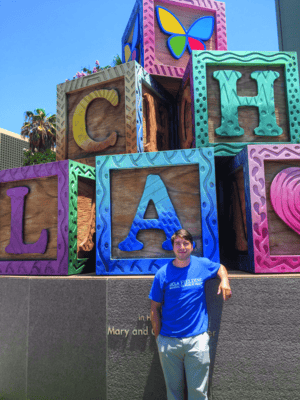 IN MY ROLE AS A RESEARCH INTERN for the Pediatric Injury Prevention Scholars program within the trauma department at Children’s Hospital Los Angeles (CHLA), I worked on research aiming to keep kids out of the emergency room. My main goal was to develop an original study for that purpose, and in the process I found there is a gap in the literature on smartphone applications aiming to reduce distractions among teen drivers. Motor vehicle crashes are the biggest killer of U.S. teens. My survey study focuses on parental perceptions regarding those apps and the barriers that are keeping parents from implementing them.
IN MY ROLE AS A RESEARCH INTERN for the Pediatric Injury Prevention Scholars program within the trauma department at Children’s Hospital Los Angeles (CHLA), I worked on research aiming to keep kids out of the emergency room. My main goal was to develop an original study for that purpose, and in the process I found there is a gap in the literature on smartphone applications aiming to reduce distractions among teen drivers. Motor vehicle crashes are the biggest killer of U.S. teens. My survey study focuses on parental perceptions regarding those apps and the barriers that are keeping parents from implementing them.
Along the way I was also able to contribute to a few grants, my favorite of which was for an initiative to tailor active-shooter trauma training to high school students. I loved that we were trying to tackle an issue that makes many people uncomfortable, because those are the issues that tend to need the most attention. I found the team I worked with at CHLA inspiring; as a result, I am staying with the trauma department through the academic year, and am considering pursuing injury prevention as a career.
Lamar Hayes
MPH Student
Department of Environmental Health Sciences
Summer Training: Sonke Gender Justice, Cape Town, South Africa
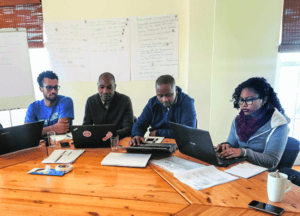 I INTERNED LAST SUMMER at Sonke Gender Justice, a nonprofit organization in Cape Town, South Africa that works across Africa to promote gender equality. In conjunction with a master’s student in public health at the University of Cape Town, my work aimed to improve maternal and infant/child health outcomes by creating an online program for Sonke’s fatherhood campaign training curriculums.
I INTERNED LAST SUMMER at Sonke Gender Justice, a nonprofit organization in Cape Town, South Africa that works across Africa to promote gender equality. In conjunction with a master’s student in public health at the University of Cape Town, my work aimed to improve maternal and infant/child health outcomes by creating an online program for Sonke’s fatherhood campaign training curriculums.
This opportunity to help advance global health outcomes was a great educational experience in building culture-specific content. My internship enabled me to better understand some global health successes, as well as the challenges of implementing initiatives while being conscious of social stigmas and atmospheres in different countries. Learning about the culture and experiences of the population was something I thoroughly appreciated, and it will be invaluable for my future work in the field. Acquiring knowledge about community trainings and events in a foreign country gave me a firsthand view of some of the differences in how public health initiatives unfold in other countries. The experience enhanced my interest in global health and increased my awareness of global health issues. It solidified my desire to work abroad with underrepresented populations in an effort to improve maternal and infant/child health outcomes.
Ryan Assaf
MPH Student
Department of Epidemiology
Summer Training: Universidad Peruana Cayetano Heredia, Lima, Peru
 I HAD THE PLEASURE OF completing my summer internship in the epidemiology program at Universidad Peruana Cayetano Heredia in Lima, Peru, under the direction of Dr. Kelika Konda [adjunct assistant professor in FSPH’s Department of Epidemiology and in the David Geffen School of Medicine at UCLA]. My work with Dr. Konda on HIV prevention efforts entailed setting up and providing training to clinical staff at 10 sites for the distribution of PrEP, a medication that can prevent HIV. This was part of a study that was also being conducted in Brazil and Mexico. My main role was to investigate and develop a research question from data collected in a preliminary survey. I performed literature reviews, coding and statistical analyses, which led to the submission of two abstracts to a conference as first author and second author.
I HAD THE PLEASURE OF completing my summer internship in the epidemiology program at Universidad Peruana Cayetano Heredia in Lima, Peru, under the direction of Dr. Kelika Konda [adjunct assistant professor in FSPH’s Department of Epidemiology and in the David Geffen School of Medicine at UCLA]. My work with Dr. Konda on HIV prevention efforts entailed setting up and providing training to clinical staff at 10 sites for the distribution of PrEP, a medication that can prevent HIV. This was part of a study that was also being conducted in Brazil and Mexico. My main role was to investigate and develop a research question from data collected in a preliminary survey. I performed literature reviews, coding and statistical analyses, which led to the submission of two abstracts to a conference as first author and second author.
A major driver for my working in Peru was to learn Spanish and obtain a strong understanding of the culture, which I can continue to draw on in Los Angeles. The experience I gained helped to reinforce what I learned in my first year as an MPH student, confirmed my desire to go into research involving prevention of infectious diseases, and opened the door to my participation in global work. I plan to continue to a PhD, with the hope of returning to Peru to pursue further research.
Esther Gao
MPH Student
Department of Community Health Sciences
Summer Training: Sustainable Economic Enterprises of Los Angeles
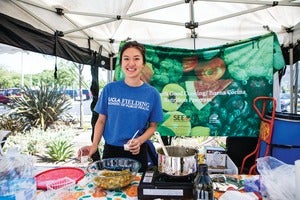 WITH THE SUPPORT OF Supplemental Nutrition Assistance Program Education funding through the Los Angeles County Department of Public Health, I worked with Sustainable Economic Enterprises of Los Angeles (SEE-LA) to create and implement a pilot project that encouraged small-farm business owners to promote healthy foods and relay nutrition messages about their produce to customers. Market visitors were encouraged to try samples highlighting market produce and received recipe cards with fact sheets that summarized the recipe’s nutritional benefits. Given my interest in chronic disease prevention and my love of nutrition, it was an ideal experience.
WITH THE SUPPORT OF Supplemental Nutrition Assistance Program Education funding through the Los Angeles County Department of Public Health, I worked with Sustainable Economic Enterprises of Los Angeles (SEE-LA) to create and implement a pilot project that encouraged small-farm business owners to promote healthy foods and relay nutrition messages about their produce to customers. Market visitors were encouraged to try samples highlighting market produce and received recipe cards with fact sheets that summarized the recipe’s nutritional benefits. Given my interest in chronic disease prevention and my love of nutrition, it was an ideal experience.
I was drawn to SEE-LA’s mission of supporting not only members of the community, but also small-farm business owners. The internship showed me the time and dedication public health professionals devote to the field. Their passion was inspiring, and it sparked my interest in improving access to resources such as healthy foods for disadvantaged communities. Every week I looked forward to having conversations about food with interested patrons and watching their surprised faces when they tried a new vegetable for the first time. The experience solidified my desire to work in the community and pursue a career in which I am directly interacting with the community members I serve.
Mark Alsay
MPH Student
Department of Health Policy and Management
Summer Training: AIDS Healthcare Foundation, Los Angeles
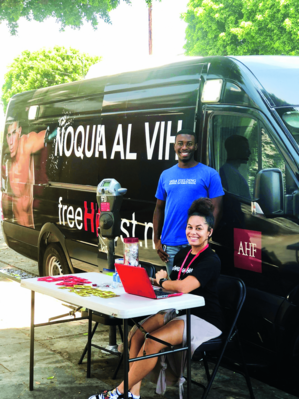 AS A PROCESS IMPROVEMENT intern at the AIDS Healthcare Foundation (AHF) in Los Angeles last summer, my job was essentially to analyze data on HIV/STD testing processes to establish benchmarks that would improve the organization’s ability to bring people who are HIV/STD-positive into care. I took this opportunity because I wanted to broaden my experiences by working in a nonprofit setting. Over the 10-week period I learned a great deal about the organization, its culture and its people. One of the major lessons can be summed up in the mantra, “No margin, no mission.” It highlights the critical role capital and money play in the organization’s ability to fulfill its mission, which is to provide high-quality care regardless of ability to pay.
AS A PROCESS IMPROVEMENT intern at the AIDS Healthcare Foundation (AHF) in Los Angeles last summer, my job was essentially to analyze data on HIV/STD testing processes to establish benchmarks that would improve the organization’s ability to bring people who are HIV/STD-positive into care. I took this opportunity because I wanted to broaden my experiences by working in a nonprofit setting. Over the 10-week period I learned a great deal about the organization, its culture and its people. One of the major lessons can be summed up in the mantra, “No margin, no mission.” It highlights the critical role capital and money play in the organization’s ability to fulfill its mission, which is to provide high-quality care regardless of ability to pay.
Working at a large nonprofit like AHF has affected the way I think about solving issues of health and social justice. Seeing how the organization utilizes its resources to provide testing, outreach, medical care, advocacy and now housing to the communities it serves has inspired me to work to build more dynamic programs that can address the same issues in other communities.
Marufa Khandaker
MPH Student
Department of Community Health Sciences
Summer Training: International Centre for Diarrhoeal Disease Research, Dhaka, Bangladesh
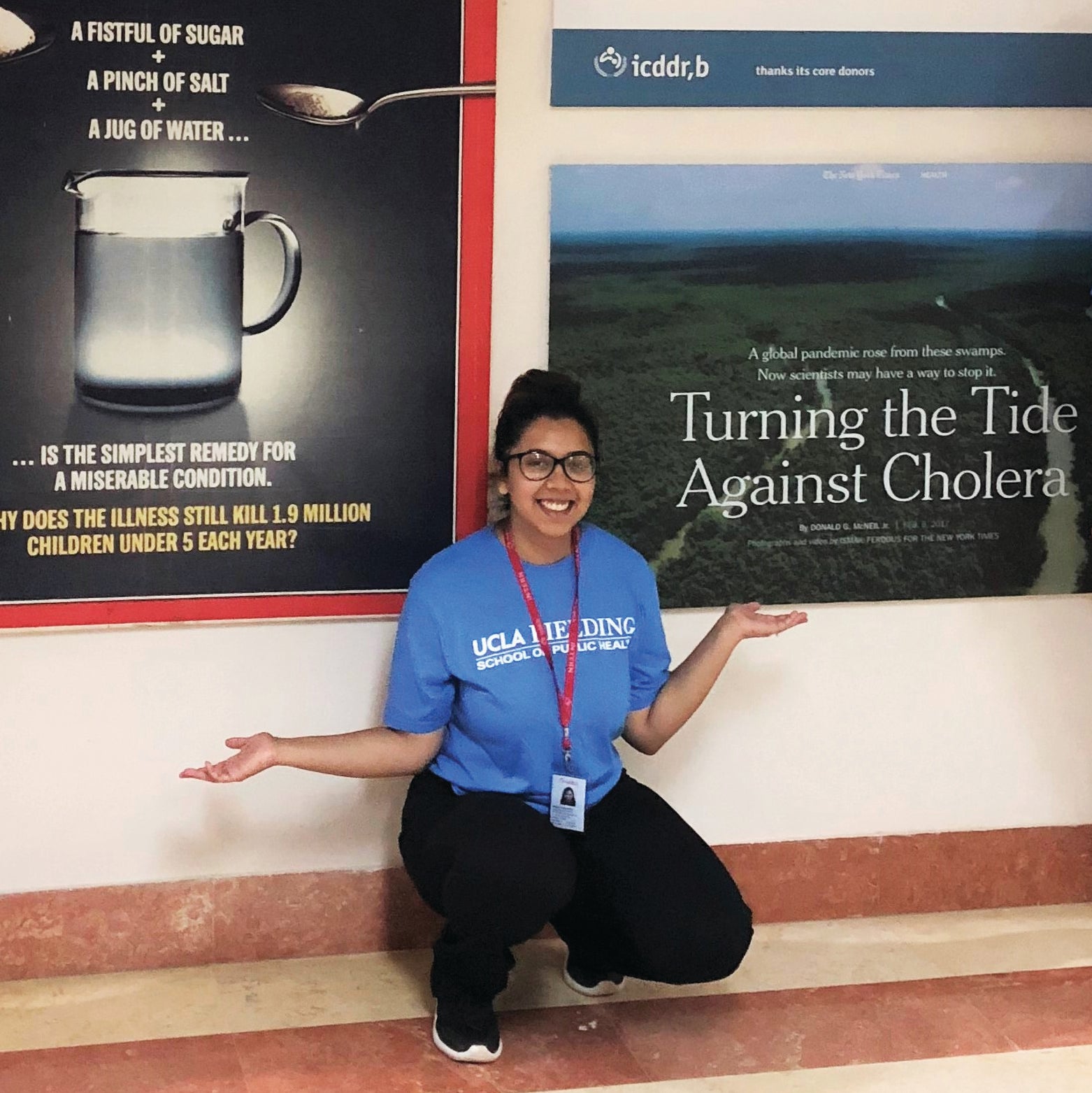 MY INTERNSHIP AT the International Centre for Diarrhoeal Disease Research, Bangladesh, a global health research institute based in Dhaka, Bangladesh, represented a once-in-a lifetime opportunity to return to my roots and work in my parents’ home country. I have always wanted to learn more about the country my parents emigrated from, particularly its inadequate and fragmented health care system — which had frequently served as a barrier to quality health care for some of my family members. What’s more, this was a chance to participate in the efforts of an organization my paternal grandfather had worked in as it was being created, to walk in his footsteps and see Bangladesh through a local lens.
MY INTERNSHIP AT the International Centre for Diarrhoeal Disease Research, Bangladesh, a global health research institute based in Dhaka, Bangladesh, represented a once-in-a lifetime opportunity to return to my roots and work in my parents’ home country. I have always wanted to learn more about the country my parents emigrated from, particularly its inadequate and fragmented health care system — which had frequently served as a barrier to quality health care for some of my family members. What’s more, this was a chance to participate in the efforts of an organization my paternal grandfather had worked in as it was being created, to walk in his footsteps and see Bangladesh through a local lens.
Through my projects, which focused on health-service planning and the development of effective referral systems, I gained a tremendous amount of knowledge — about the current health care system, the disease burden of slum communities, and the health-seeking behaviors and preferred providers of the people in these communities. Living like a local during student-led protests also broadened my understanding of the corrupt political climate of Bangladesh. Overall, the experience showed me the importance of research and medicine, especially as a voice to address the needs of the unheard, and fueled my passion for global health work.